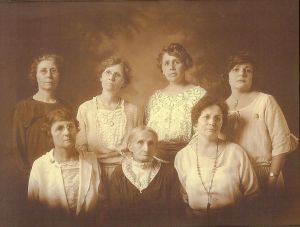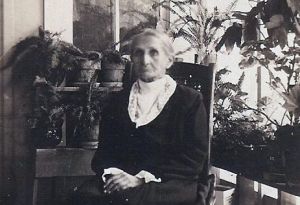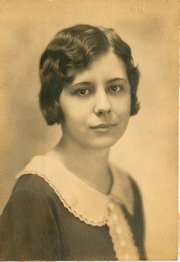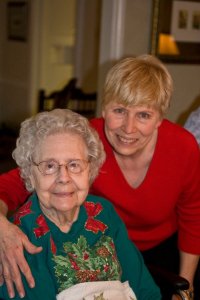This is another article written by my great-grandmother, Augusta, in the 1940s. I have made a few explanatory comments, in brackets, and have linked the article to relevant material available elsewhere online. Another article by Augusta—a story of the founding years of Comfort, Texas—is available here.
Mrs. Rosalie Hess Dietert
by Augusta Dietert Schulze (1871-1950)
Mrs. Christian or Rosalie Dietert [1833-1929] was a well-educated woman, having finished—as it was called—at a girls’ seminary at the University, City of Jena, Germany. She was a small dark haired, and brown-eyed woman, weighing about 110 pounds, though what she lacked in size she made up in a charming and energetic personality. Coming to a new and unsettled country still over-run with Indians did not daunt her. She went to live with Mrs. Theo. Wiedenfeld near Comfort[, Texas]. Later she went to live with a Mrs. Ridley some miles west of Comfort where she began the study of the English language.
After her marriage with Mr. Christian Dietert [1824-1902] she settled down in a small cabin in Comfort, to housekeeping with a skillet, a small dutch oven (which was a small round iron pot with three legs and a dented-in lid to hold live coals), and a brass kettle holding about one gallon, for cooking utensils. But they were enough for the little they had to cook in those days when they had to do the cooking on a fire outside their doors. Meat there was always plenty, venison, wild turkey, fish, occasionally bear, and later beef. In the beginning there were practically no vegetables. They made a salad of wild parsley and tea from a variety of the small prairie sage, and greens from the “lamb’s quarters” or “land squatters.” Mrs. Gustave Dietert, my father’s mother, brought some vegetable seeds when they came to Comfort in 1855.
Among them were some German peas which did exceptionally well here. Everyone was anxious to get a few for a start. It is noteworthy to state that the strain of this hardy pea has been kept and planted year after year by members of our family to our present time.
Some one brought a handful of squash seed to the colony which was distributed among friends; the fruits of these were not relished at first, but they flourished amazingly, and there were few vegetables to choose from. They soon learned to cook then and make them palatable.
For coffee they used a mixture of cracked and parched post oak acorns, rye and wheat grains. Later coffee was brought from Mexico. The furniture was home-made of walnut and cherry wood. [My family still has one of the bent-wood chairs, with a seat of cowhide.] The decorating was up to the women. Her home was not long without homey decorations. For the bare windows she made curtains from widths of a voluminous skirt of those days which were the admiration of all her friends; a wall basket that seemed to be a distinctive decoration of every pioneer home, to hold letters and patterns was a semi-circle foundation of stiffened cloth or paper and covered with a piece of material with cross-stitched flower design with colored wool thread; or a crocheted piece, or a velvet beaded piece, just whatever their store of treasure yielded. Mother was an expert at handiwork which she willingly taught others. Rugs were made of corn husks or plaited of worn-out trousers and coats. She also made lovely pieces of crochet for the dresser and table. Among her treasures from across the sea she brought a set of silver knives and forks and spoons and lovely linen table cloths. For their bed spreads they pieced and quilted the loveliest quilts, some of which can still be found in homes. Every spring the house got its inside and outside coat of white wash.
Once or twice a year a pattern package came from across the sea. This was always welcomed, for it contained all sorts of handiwork patterns and a large sheet with patterned lines running up and down and criss-cross, designating certain types of dress patterns. To me when I saw a last relic of one, they looked much like a road map of today. One of which shows paved, graveled, or all weather roads. They were eagerly sought after. Dangers of Indian raids were still prevalent, so visits between places were few. When they did visit, they went two, three, or four together on horseback and side saddles. Between the stretches of homes they went in a full gallop all the way. Horseback riding was one of mother’s first accomplishments in the new country.
In about 1870 some cook stoves were brought west as far as San Antonio, one of which mother became the proud possessor. No more out-door cooking in all sorts of weather—a stove and a real oven to bake bread and cakes! Her recipes were gotten out, and all sorts of good things were made for holidays and birthdays. The favorites were stollen
(loaf cake), pfeffernusse (spice cookies) and schnecken (a sweet dough rolled out flat and covered with brown sugar, cinnamon, raisins, currants and pecan meats. This was all rolled up, cut into slices and baked.) This recipe soon became very popular and was given to all who asked for it until it was used in most of the homes in Kerr county. Recently at a gathering I found a dish of schnecken and I asked about it. The maker said they were the “Dietert Cookies.” “My grandmother got the recipe from Mrs. Dietert. They are still our favorite cookies,” she said. I had the pleasure of telling her that I was one of Mrs. Dietert’s daughters. It may be of interest to add that mother used the popular sour dough for leavening for loaf cakes. They were set in a warm place to rise. For cookies eggs were used plentifully with lots of hard beating to incorporate air.
Mother played no musical instruments, but she had a sweet singing voice and taught her children many Lutheran church hymns. Most of the Christmas carols are still popular today. While frequently attending services in churches of other denominations, she remained true to her Lutheran faith to the end.
* * *
From a biographical sketch Augusta dictated to her daughter-in-law in the 1940s: Rosalie Hess was born in Bavaria, Germany in 1833, the daughter of Alfred Hess & Clara Graefe Hess. She had one brother, Rudolph Hess, who remained in Germany. No sisters. Rosalie’s father taught graphic art at the University of Jena. Her mother died when she was 13 and after her father’s death 6 years later, she lived awhile with her married brother and engaged in tutoring. This life was distasteful to her and she joined friends and sailed for America [on March 15, 1854], bringing a few of her cherished possessions including a few of her mother’s jewels and her father’s art.
* * *
From a school project published in a local paper by one of Rosalie’s granddaughters:
“‘Grandma, what was here when you came to Kerrville?’
‘Nothing, my child, but a cluster of five small log huts, of one or two rooms, a wilderness of trees, and grass as high as a man, with Indians skulking through. Your grandfather built the sixth house. It had three rooms and was built of cypress timbers cut on the saw mill he set up at the place where the ice plant now stands.’
Thus answered Grandmother Dietert to a query of her great-granddaughter, who looked at a slightly built woman of 93 years…
‘What ever made you leave your home, brave the sea and throw your lot in an unknown land?’
‘With me it was the spirit of adventure. All the papers were full of the new world and of Texas. With the men it was for the most part a question of political freedom.'”
* * *
Oral history from Edith Schulze Stromberg, Rosalie Dietert’s granddaughter: “My grandmother had twelve babies in the wilderness, without a doctor around. There was a lady who knew what to do – there was no medication or life support. People had a lot of babies – if they lost one, they knew they would have more. Sometimes my grandfather had to do the honors and deliver the babies.” Christian’s & Rosalie’s children, in order of birth, were Gustave Dietert (1855-1939), Clara Dietert Ochse (1858-1913), Lena Dietert Herzog (1859-1933), Emelia Dietert Enderle (1863-1938), Rudolph Dietert (1865-1941), Henry Dietert (1867-1944), Otto Dietert, Augusta Dietert Schulze (1871-1950), and then the three youngest girls—Emma Dietert Rosenthal (1874-1938), Valeska Dietert Mosel (1877-1945), and Flora Dietert Weiss (b. 1879)—who, according to Augusta, “became my charges as I grew.” One daughter, Rosalie, died in infancy.











